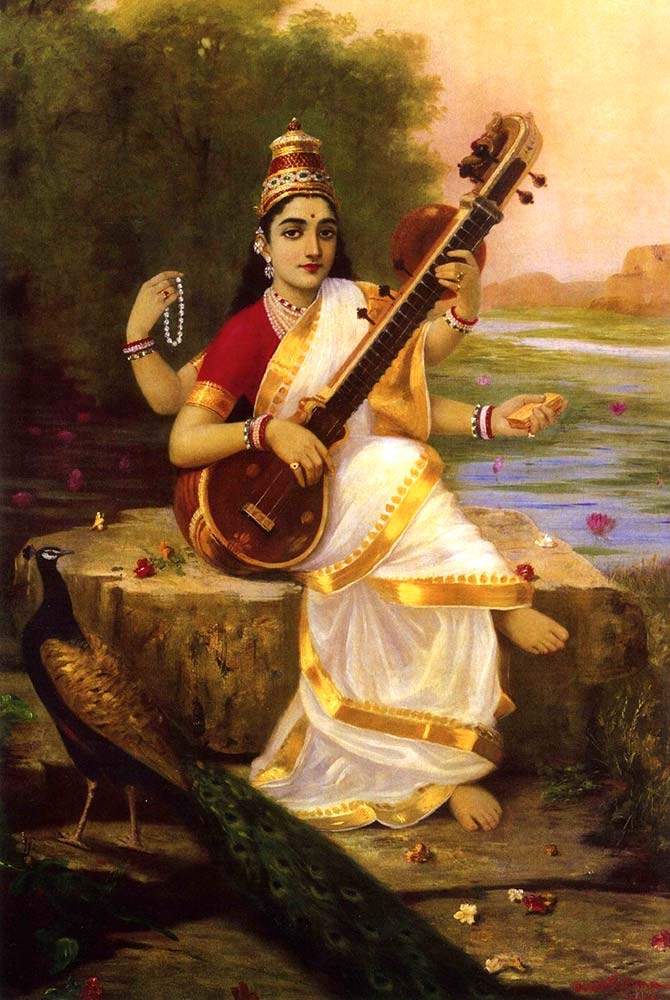- Visitor:146
- Published on: 2024-10-10 01:33 pm
The Story, Symbol, and Significance of Mahāgaurī
Cladded in white apparels and adorned with chalky flowers, she stood before Śiva who could not take his eyes of her! Mesmerized, he named her ‘Mahāgaurī’, the brightest of the glowing ones! She tittered at her bedazzled husband and sat on his mount, Nandi, asking her husband to take her to his abode in the Kailāśa.

Story
Remember when Śatī relinquished her body in the yajña at king Dakṣa’s palace and resurrected as Pārvatī to perform severe penance? She was born with a fair and glowing complexion. However, as she underwent tremendous austerity, her physique decayed and her fair complexion tanned to negritude. When she eventually succeeded in her sādhanā and secured the boon from Brahmā, she returned happily to her home. However, when Śiva arrived at the venue, he poked fun of Pārvatī’s changed complexion in a light-hearted banter, calling her Kālī.
However, as wives are, she did not take Śiva’s humour lightly. She got upset. Observing this, Śiva tried to console her, saying that it hardly mattered to him if she was of fair or dark complexion for only the purity of the heart matters at the end. However, Pārvatī was adamant. She prayed to Brahmā to regain her fair complexion. Brahmā advised her to take a dive into the holy water of the Gaṅgā. Following that, she took bath in the river and all the murkiness of her body faded away as she emerged out of the water lustrously fair as her divine body coruscated with refulgence.
Cladded in white apparels and adorned with chalky flowers, she stood before Śiva who could not take his eyes of her! Mesmerized, he named her ‘Mahāgaurī’, the brightest of the glowing ones! She tittered at her bedazzled husband and sat on his mount, Nandi, asking him to take her to his abode in the Kailāśa.
Symbol
The quintessence of this anecdote lies in celebrating the humours of conjugal life. Śiva is the wisest of all divine beings and he cares two hoots about physical beauty or skin complexion. With deadlocks on his head and ashes smeared all over his body, it needs no saying that he concerns himself with true beauty of the inner self, not the outer paraphernalia. On the other hand, Pārvatī is the divine feminine and she has outgrown all sense of lingering after mundane beauty or material prosperity. Yet, when they come together, Śiva makes fun of her complexion and Pārvatī gets sulky— making the entire episode a scope for the enjoyment of sportive humour. After all, without occasional humour, what is the purpose of mere wisdom but to dullen our life?
Pārvatī's desire to regain her fair complexion through Brahmā’s advice to bathe in the Gaṅgā symbolizes the quest for purification and renewal. The holy river is a powerful symbol in the Sanātana Dharma, representing the cleansing of sins and the restoration of spiritual integrity. As she emerges from the water, her radiant form reflects not just physical beauty but also the culmination of her spiritual journey, embodying the idea of śuddhikaraṇa (purification).
Upon returning to Śiva as Mahāgaurī, Pārvatī embodies the divine feminine in its fullest expression— radiant, powerful, and deeply connected to her divine essence. Clad in white and adorned with beautiful flowers, she represents purity and strength. Her confidence and joy in this transformation highlight the importance of self-acceptance and the realization that true beauty arises from embracing one’s complete self, including both light and dark aspects.
Significance
Worshipping Mahāgaurī offers profound spiritual understanding which may be observed as rooted in her transformative journey from Kālī to the divine form of Mahāgaurī. Just as Pārvatī underwent austerity and emerged purified, devotees may seek Mahāgaurī’s grace to cleanse their minds and souls, overcoming negativity and impurities in their lives. Her story of perseverance through trials symbolizes the strength required to face life’s challenges. Worshipping her instils courage, empowering devotees to overcome obstacles with grace. Mahāgaurī is also revered for granting boons and fulfilling the heartfelt desires of her devotees, particularly those seeking harmony in relationships, prosperity, and spiritual growth.
Apart from that, Mahāgaurī also represents the divine feminine, encompassing purity, strength, and nurturing. Her worship fosters reverence for feminine qualities, encouraging balance in the universe. So, do pluck some white flowers and offer them to the divine mother, chanting:
ॐ श्वेते वृषे समारुढा श्वेताम्बरधरा शुचिः।
महागौरी शुभं दद्यान्महादेवप्रमोददा।।
सिद्धगन्धर्वयक्षाद्यैरसुरैरमरैरपि।
सेव्यामाना सदा भूयात् सिद्धिदा सिद्धिदायिनी॥
॥ ॐ देवी महागौर्यै नमः ॥
- 73 min read
- 3
- 0










